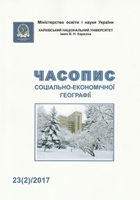Ecological knowledge and sustainable planning in Nigeria: a reflection on the Yorubas of South-Western Nigeria
Abstract
In pre-colonial times, African people survived by acquiring and preserving community knowledge of the environment and the relationships between human and non-human elements. The paper is based primarily on secondary data, and examines the relationships between African people, especially Yoruba people of southwestern Nigeria and the land and how understanding this relationship can help our quest for a more effective and sustainable regional planning. The study investigates the indigenous Yoruba Ecological Thoughts and Beliefs and how these affected the ways people have interacted with the environment. The result shows that there is a lot that modern planning can gain from the culture-environmental relationships of the indigenous people.
Indigenous knowledge is the cornerstone of several convergent trends in social science thinking and development administration practice. With the failure of grand theories of development, social sciences focus on middle-range theories that are site – and time-specific (indigenous knowledge). Both traditional knowledge and modern science and technology should be complementary in the development process and should be properly integrated. People are the subject of development. Development is supposed to suit the people and not the people to suit development. If Africa does not learn this lesson now, all our efforts at the development will be in vain, because Africa is ultimately only as strong as its communities are.
Downloads
References
2. Agrawal, A. (1995). Dismantling the divide between indigenous and scientific knowledge. Development and Change, 26(3), 413-439.
3. Agawal, A. (1995). Indigenous and scientific knowledge: some critical comments. IK Monitor 3(3). Available at: http://www.nuffic.nl/ciran/ikdm/3-3/articles/agrawal.html.
4. Briggs, J. (2005) The use of indigenous knowledge in development: problems and challenges. Progress in Development Studies, 5(2), 99-114. Available at: http://eprints.gla.ac.uk/archive/00001094/
5. Brokensha, D., Warren, D., Werner, O. (eds) (1980). Indigenous knowledge systems and development, Lanham: University Press of America.
6. Casimirri, G. (2016). Problems with integrating traditional ecological knowledge into contemporary resource management, Proceedings of the XII World Forest Congress, Quebec, Canada. Available at: http://www.fao.org/docrep/ARTICLE/WFC/XII/0887-A3.HTM
7. Compton, J. (1989). The integration of research and extension, pp. 113-136 in J.L. Compton (ed) The transformation of international agricultural research and development. Boulder: Lynne Rienner.
8. Copra, F. (1982). The Turning Point. Simon and Schuster.
9. Dekens, J. (2007). Local Knowledge for Disaster Preparedness: A Literature Review. International Centre for Integrated Mountain Development, Kathmandu.
10. Fernando, J.L. (2003). NGOs and production of indigenous knowledge under the condition of postmodernity. Annals of the American Academy of Political and Social Science, 590, 54-72.
11. FAO (2014). State of the World's Forests. Food and Agriculture Organization of the United Nations, Rome. Available at: http://www.fao.org/3/a-i3710e.pdf
12. Harisha, R.P., Padmavathy, S., Nagaraja, B.C. (2016). Traditional Ecological Knowledge (Tek) And Its Importance In South India: Perspective From Local Communities in Applied Ecology and Environmental Research, 14(1), 311- 326
13. Harisha, R.P., Padmavathy, S. (2013). Knowledge and use of the wild edible plant in two communities in MalaiMadeshwara Hills, Southern India. International Journal of Botany, 9(2), 64-72
14. Hill, S. (2008). Traditional Knowledge. Unpublished Ph.D. Seminar presentation, University of Manitoba.
15. Gupta, A. (1992). Building upon people's ecological knowledge: Framework for studying culturally embedded CPR institutions. Ahmedabad: Indian Institute of Management, Center for Management in Agriculture.
16. Mbiti, S. John (1969) Introduction to African Religion. Available at: www.harford.com/archives/30/197.html
17. Mercer, J., Dominey–Howes, D., Kelman, I., Lloyd, K. (2007). The potential for combining indigenous and western knowledge in reducing vulnerability to environ- mental hazards in small island developing states. Environmental Hazards, 7(4), 245-256.
18. Nadasdy, P. (1999). The politics of TEK: power and the “integration” of knowledge. Arctic Anthropology, 36,1-18.
19. Niamir, M. (1990). Herder' decision-making in natural resource management in arid and semi-arid Africa. Community Forestry Note 4. Rome: Food and Agriculture Organization. BO9781139030717
20. Reyes-Garcia, V., Huanca, T., Vadez, V., Leonard, W., Wilkie, D. (2006). Cultural, Practical and Economic value of Wild Plants: A quantitative study in the Bolivian Amazon. Economic Botany 60(1), 62-74 South Africa, South African Journal of Science, 99, 23-25.
21. Sillitoe, P. (1998). The development of indigenous knowledge: a new applied anthropology. Current Anthropology, 39(2), 223-252.
22. Sillitoe, P. (2000). Let them eat cake: indigenous knowledge, science and the "poorest of the poor". Anthropology Today, 16(6), 3-7.
23. Tran, P. and Shaw, R. (2007). Towards an integrated approach of disaster and environmental management: a case study of Thua Thien Hue province in central Vietnam. Environmental Hazards, 7(4), 271-282.
24. United Nations CBD (2016). Traditional Knowledge and the Convention on Biological Diversity. Available at:
25. UNESCO (2016). Synergies between Scientific 7 Indigenous knowledge in Local and Indigenous Knowledge Systems (LINKS). Available at: www.unesco.org/links
26. UNESCO (2002). Local and Indigenous Knowledge Systems. Available at: http://www.unesco.org/ links/
27. U.S. Fish and Widlife Service (USWFS) (2011). Traditional Ecological Knowledge for application by service scientists. Available at: http://.www.fws.gov.nativeamerican/graphics/TEK_Fact_Sheet.pdf. June, 2017.
28. Warren, D.M. (1990). Using indigenous knowledge in agricultural development. World Bank Discussion Paper 127. Washington DC: World Bank.
29. Warren, D.M., G.W. von Liebenstein, L. Slikkerveer (1993). Networking for indigenous knowledge. Indigenous Knowledge and Development Monitor, 1(1), 2-4.
Copyright (c) 2017 Oladayo Ramon Ibrahim

This work is licensed under a Creative Commons Attribution 4.0 International License.




